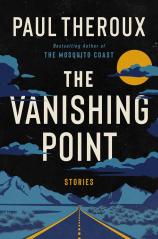The Vanishing Point: Stories
Review
The Vanishing Point: Stories
In art, the term "vanishing point" refers to the point at which receding parallel lines, when viewed in perspective, appear to converge. It’s an appropriate metaphor for Paul Theroux’s THE VANISHING POINT, a captivating collection of short stories that repeatedly revisit the themes of aging and death, but also are very much concerned with living life as it presents itself in the moment.
Theroux’s prolific career spans almost six decades, during which he has produced nearly 30 novels, including the bestseller THE MOSQUITO COAST, and numerous nonfiction works, among them classics of travel writing like THE OLD PATAGONIAN EXPRESS. THE VANISHING POINT is his seventh collection of short fiction, and it comprises 18 stories, all of which are intelligent and well-constructed. Some feature startling endings, while others pack a powerful emotional punch. Anyone looking for classic storytelling with credible characters and, in many cases, a satisfying narrative arc of almost novelistic breadth will find much to enjoy here.
"Anyone looking for classic storytelling with credible characters and, in many cases, a satisfying narrative arc of almost novelistic breadth will find much to enjoy here."
The title story that opens the collection possesses all of those characteristics. After he’s discharged early from the Navy with hearing damage and obtains his college degree, Guy Petit, a carpenter and welder, finds work stretching and framing large canvases as an assistant to a prominent Maine artist. When he loses that job, he moves on from one increasingly modest circumstance to another, but with surpassing equanimity and grace. “Guy had never thought of happiness as a goal,” Theroux writes, “but only of the contentment of having enough.” The story’s final paragraph brings it full circle in a deeply rewarding conclusion.
Several of the stories in THE VANISHING POINT are set in Hawaii, where Theroux lives part-time. The most memorable is “A Charmed Life.” Felix Jardin, who has spent his adult life as an expatriate teacher, has retired to the islands in his late 60s. As he reflects on his life, he experiences an epiphany: “At my advanced age, I saw a pattern --- not random instances of luck, not amazing coincidences, but a succession of wishes I’d made over many years that were granted: answered prayers.” As Felix deliberates how he’s going to use that power in his final years, the story swiftly moves on to its shocking ending.
Other stories like that one, which might find a comfortable home in a Stephen King collection, include “Adobo,” an ultimately terrifying encounter between a retiree fresh from his marriage to a much younger Filipino woman and wild pigs on Oahu’s North Shore, and “Head Master,” the chilling story of another expatriate teacher and his relations with local African villagers. “Father X,” inspired by an entry in one of Henry James’ notebooks, is an emotionally resonant tale of one man’s inadvertent discovery of his father’s past only after he passed away. Each demonstrates Theroux’s skill at working within a limited compass to produce a fully realized story.
In its final third, entitled “Aide-Mémoires,” THE VANISHING POINT takes a decisive turn, following a single character through several stories --- first in his early teenage years and then again as an old man. It leads off with one of its lengthier stories, “Camp Echo,” which introduces 12-year-old Andre (Andy) Parent as he’s delivered to a three-week New England Boy Scout summer camp in the 1950s. Admitting that he was “known at home as a dreamer,” Andy watches with an air of detachment as, one by one, several of his cabin mates depart early. He begins to gain some confidence in his own powers, even as he’s disappointed by the adults charged with advancing his development.
Andy’s education proceeds in “Stop & Shop.” There, as a 15-year-old, he learns some of the realities of life from his co-workers at the grocery store where he works part-time, balancing that job with his schoolwork and his play on the soccer team, where he mostly rides the bench. At this stage of his life, when he admits “I was not adrift, I was stuck” and that he has little notion of what to do with all the messages he’s receiving from the adult world, he has “an intimation, not that I would be a writer in any important way, but that writing this down might help ease my mind.”
The final four stories fast forward six decades in the life of Andy, now firmly ensconced in the identity of Andre Parent, a writer whose career description seems to bear some superficial resemblance to his creator’s. Theroux touchingly depicts him introducing his 11-year-old grandson to the beauty and agony of first love in an eponymous story, struggling with the generation gap and gender issues in his relationship with a research assistant (“The Silent Women” and “Ghost Fest”) and facing questions of mortality, grief and posthumous literary reputation over a weekly chess game with another aging writer (“Finitude”).
“Think of it as my late period. In the nature of a farewell…” Andre tells an old friend, a retired lawyer now residing in an assisted living facility, in “Ghost Fest,” the collection’s penultimate story. As he revealed in a 2024 New York Times interview, Theroux has no intention of abandoning his work. “When at last I fall off my chair, I suppose that will be my way of stopping,” he told the Times. Based on the quality of the stories in THE VANISHING POINT, his desire to persevere well into his ninth decade comes as welcome news.
Reviewed by Harvey Freedenberg on February 1, 2025
The Vanishing Point: Stories
- Publication Date: January 27, 2026
- Genres: Fiction, Short Stories
- Paperback: 336 pages
- Publisher: Mariner Books
- ISBN-10: 0063432528
- ISBN-13: 9780063432529




